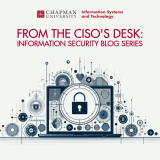Cyber Security Quarterly Newsletter FEBRUARY 2022 - Volume 1 Issue 1
February 10, 2022
Cyber Security Quarterly Newsletter
|
New Year New Resolutions!As we all strive for New Years resolutions in 2022, Infosec has one of its own. To help keep our faculty and staff safe and secure, Infosec will be sending out a quarterly informational security newsletter |
FACTS AND FIGURES
|
| SECURITY TIP – YOUR EMAIL SUBMISSIONS MAKE A DIFFERENCE
Chapman users receive phishing and scam emails on a regular basis. While we do our best to filter these out before they get to you, some slip past and land in your inbox. Infosec actively reviews |
| DID YOU KNOW?!?
Infosec responded to ~1200 abuse submissions in 2021 |
| SCAMS TO LOOK OUT FOR:
Romance Scams Soulmate or cybercriminal? Watch for these signs that your “true love” might be a romance scammer who will leave you with a broken heart and empty bank account.
IRS/Tax Scams
Remember: Chapman provides examples of type of scam & phishing attacks at |


